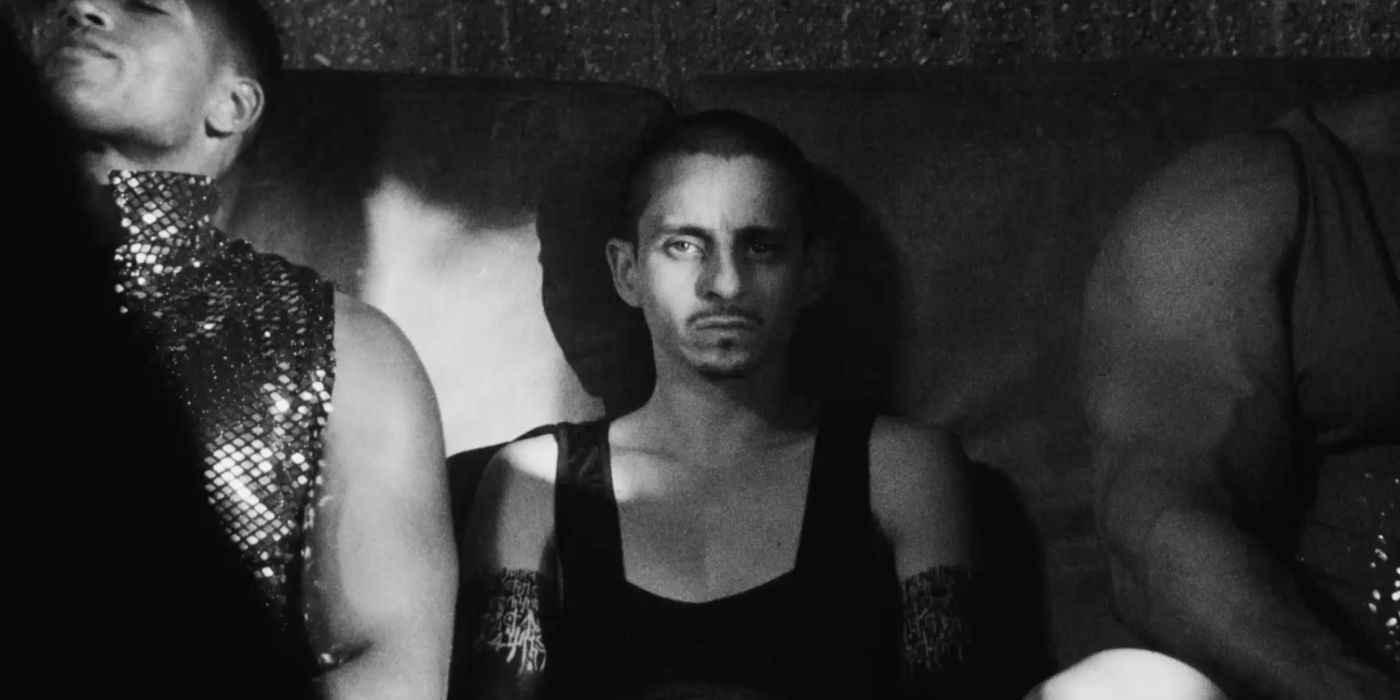Divinity comes to us like a black box communiqué from a retro-futuristic alternate history that no longer exists – if it ever existed at all. It's got all of the staticky hallmarks of a sci-fi distress signal, but is a feature-length experimental feature courtesy of writer-director Eddie Alcazar (Perfect), who has been doling out mildly abrasive antidotes to the clean-cut sameness of contemporary science fiction over the past several years.
In 2023, we, the moviegoing audience, have grown quite accustomed to the polished veneer of films that have the financial push to be foregrounded in popular culture. Though not true of all, these films often have palatably bland cinematography, and a dutifully single-minded adherence to structure. Sure, it's great to sit back and watch something that holds your hand to a desired outcome, but these pleasures come at the cost of the part of ourselves that would once gladly hand over a couple of hours to someone who wants to take us on an aural-visual odyssey with little to guide us other than a healthy sense of curiosity.
Eddie Alcazar's latest film, Divinity, produced by Steven Soderbergh, throws tropes into the grinder and ends up with a meaty, noisy, experimental film, where images materialize from the murky black-and-white, and then fade back with aphoristic clarity – even if what's being said doesn't always land with heft. (After all, the script was improvised.) As for a story, there is one, but Divinity shouldn't be approached as the type of media that we are regularly inundated with. For better or worse, this is a film to submit to and, more importantly, to experience.
In the opening sequence, we're introduced to a scientist named Sterling Pierce (Quantum Leap's Scott Bakula). His combination of self-imposed noble cause and hubris has him pursuing an immortality serum dubbed Divinity. However, he soon dies, and it's his son, Jaxxon (Stephen Dorff), who brings the project to fruition – as well as to the open market. In this new world now shaped by this drug – replete with old-timey computer graphics, and advertisements reminiscent of watching BowFlex ads in the middle of a hypnagogic stupor – things are, to put it lightly, out of whack.
With longevity increased in perpetuity, humans are now free to explore hitherto unseen recesses of carnality, and the pleasures of being alive. But the key here is that Alcazar doesn't seem so keen on telling us that these visual cues for pleasure – sex, clubbing – are necessarily being experienced as anything other than rote in the wake of living forever. While it's never addressed, one also gets the sense that a side effect of Divinity is that it causes dialogic peculiarities to crop up, rendering good old-fashioned conversation a thing of the past. There's also another issue with Divinity: those who take it can no longer procreate. In short, this world has prioritized a specific type of vanity.
Meanwhile, twin brothers arrive on Earth with a mission that remains mysterious up until the end, and possibly a bit after. As they explore Earth's jagged, desert terrain, they pursue its delights – namely, sex and violence. These interlude dalliances risk coming across like a monochromatic advertisement for an unpronounceable perfume, but Alcazar keeps many threads going simultaneously. On the one hand, there's a love story; on the other, a budding body horror narrative. In another realm altogether, there is a group of pro-procreation women who offer a bizarre, running commentary that, to decipher, might defeat its purpose.
Most of the film reads like a coded message, but no easy answers are offered. On the one hand, this might be a warning against this particular type of pharmaceutical longevity, and its inherent devaluing of our definitive system of understanding: death. If this is a screed of any kind, it's against a mono-thought of believing that we need stories to come to us in government-approved dosages.
One of the great aspects of Divinity is its sound design by DJ Muggs, which draws immediate corollaries in the distorted percussive allure of early Nine Inch Nails, and William Basinski's degraded, cavernous soundscape masterpiece The Disintegration Loops. This film often breaks into a noisier (visually and aurally) realm, but always comes back to a surprisingly cogent story. These disparate elements are part of the appeal. Where one tone might be enough for some, no one can accuse Alcazar of not throwing absolutely everything into the pot.
Divinity might lack the necessary anchoring for some audiences, but it's well worth checking out. Inspiration can be found everywhere; sometimes, it takes some cinematic jostling to dislodge long-held beliefs. In a sea of sameness, it's nice to know that filmmakers are still taking huge swings with little regard for how it'll all pan out. Plus, there's a claymation fight sequence. Enough said.
Divinity opens in New York City on October 13, and in Los Angeles on October 20.


